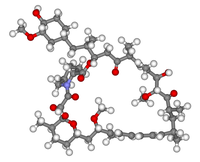
Photo from wikipedia
Hypertension‐stimulated cardiac hypertrophy and apoptosis play critical roles in the progression of heart failure. Our previous study suggested that hypertensive angiotensin II (Ang II) enhanced insulin‐like growth factor receptor II… Click to show full abstract
Hypertension‐stimulated cardiac hypertrophy and apoptosis play critical roles in the progression of heart failure. Our previous study suggested that hypertensive angiotensin II (Ang II) enhanced insulin‐like growth factor receptor II (IGF‐IIR) expression and cardiomyocyte apoptosis, which are involved JNK activation, sirtuin1 (SIRT1) degradation, and heat‐shock transcription factor 1 (HSF1) acetylation. Moreover, previous studies have implied that short‐term hypoxia (STH) might exert cardioprotective effects. However, the effects of STH on Ang II‐induced cardiomyocyte apoptosis remain unknown. In this study, we found that STH reduced myocardial apoptosis caused by Ang II via upregulation of the Mas receptor (MasR) to inhibit the AT1R signaling pathway. STH activates MasR to counteract the Ang II pro‐apoptotic signaling cascade by inhibiting IGF‐IIR expression via downregulation of JNK activation and reduction of SIRT1 degradation. Hence, HSF could remain deacetylated, and repress IGF‐IIR expression. These effects decrease the activation of downstream pro‐apoptotic and hypertrophic cascades and protect cardiomyocytes from Ang II‐induced injury. In addition, we also found that silencing MasR expression enhanced Ang II‐induced cardiac hypertrophy and the apoptosis signaling pathway. These findings suggest a critical role for MasR in cardiomyocyte survival. Altogether, our findings indicate that STH protects cardiomyocytes from Ang II‐stimulated apoptosis. The protective effects of STH are associated with the upregulation of MasR to inhibit AT1R signaling. STH could be a potential therapeutic strategy for cardiac diseases in hypertensive patients.
Journal Title: Journal of Cellular Biochemistry
Year Published: 2018
Link to full text (if available)
Share on Social Media: Sign Up to like & get
recommendations!